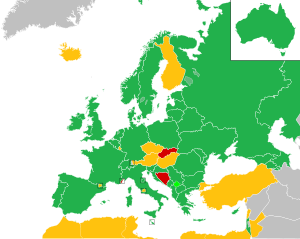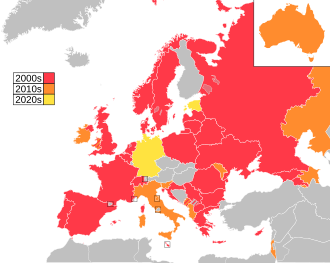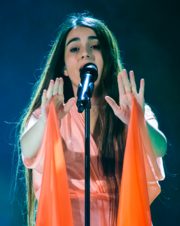


Broadcasters from forty-one countries have participated in the Junior Eurovision Song Contest since it started in 2003, with winning songs coming from twelve of those countries. The contest, organised by the European Broadcasting Union (EBU), is held annually between members of the union who participate representing their countries. Broadcasters submit songs to the event where they are performed live by the performer(s) aged 9 to 14 they had selected, and cast votes to determine the winning song of the competition.
Participation in the contest is primarily open to all broadcasters with active EBU membership, with only one entrant per country allowed in any given year. To become an active member of the EBU, a broadcaster has to be from a country which is covered by the European Broadcasting Area –that is not limited only to the continent of Europe–, or is a member state of the Council of Europe.[1] Thus, eligibility is not determined by geographic inclusion within Europe, despite the "Euro" in "Eurovision", nor does it have a direct connection with the European Union. Several countries geographically outside the boundaries of Europe have been represented in the contest: Cyprus, Armenia, and Israel, in Western Asia, since 2003, 2007, and 2012 respectively; and Australia making a début in the 2015 contest. In addition, several transcontinental countries with only part of their territory in Europe have been represented: Russia, since 2005; Georgia, since 2007; Azerbaijan, since 2012; and Kazakhstan, which made its first appearance in the 2018 edition. Australia, where the contest has been broadcast since 2003, débuted as a participant in the 2015 edition, as its broadcaster is an EBU associate member and had received special approval from the contest's Reference Group.
The Netherlands is the only country to have entered the contest each year since 2003, while Switzerland have only entered on one occasion, in 2004. Broadcasters from three countries – Slovakia, Monaco, and Bosnia and Herzegovina – have announced their intention to enter the contest before withdrawing prior to the country's début.
Participants
[edit]The following table lists the countries with a broadcaster that have participated in the contest at least once. Shading indicates countries whose broadcaster have withdrawn from the contest.
Switzerland participated in the contest once, in 2004.[2] France, who also took part that year, returned to the contest in 2018.[3] Denmark, the host country of the first contest in 2003, has not been at the contest since 2005,[4] along with Norway, who also participated in 2003.[5][6] Poland withdrew after the 2004 contest, due to placing last in both 2003 and 2004, but returned in 2016.[7] United Kingdom withdrew from the contest in 2005, but returned in 2022, and withdrawn again in 2024.[8] Spain, instead, withdrew one year later and returned in 2019. Croatia, the first winner of the contest, returned to the contest in 2014 after seven years out of the contest.[9] However, the country placed last and withdrew again.[10]
Serbia and Montenegro participated once in 2005,[11] but dissolved in 2006.[12] Serbia competed independently from the 2006 contest onwards.[13] Montenegro made their debut as an independent nation in 2014.[14]
The original Scandinavian broadcasters left the contest in 2006 because they found the treatment of the contestants unethical,[15] and revived the MGP Nordic competition, which had not been produced since the Junior Eurovision Song Contest began.[16] Sweden, however, returned to the contest the following year with a new broadcaster, TV4.[17] TV4 did not participate in 2008,[18] but returned in 2009.[19] SVT returned to the contest in 2010,[20] after TV4 withdrew earlier that year. Sweden's most recent participation was in 2014.[21]
Broadcasters of Belarus and Russia were expelled from the EBU in 2021 and 2022 respectively, preventing them from competing in future editions of the contest.[22]
| † | Inactive – countries which participated in the past but did not appear in the most recent contest, or will not appear in the upcoming contest |
| ◇ | Ineligible – countries whose broadcasters are no longer part of the EBU and are therefore ineligible to participate |
| ‡ | Former – countries which previously participated but no longer exist |
Other EBU members
[edit]The following countries have broadcasters eligible to participate in the contest, but have never done so.[23] Representatives from the broadcasters in Finland, Hungary, and Iceland have each sent observers to attend past competitions to gauge potential participation in the contest.[25] The Hungarian broadcaster also sent representatives to the 2013 Belarusian national final.[26]
 Algeria – ENTV, ENRS, TDA
Algeria – ENTV, ENRS, TDA Andorra – RTVA
Andorra – RTVA Austria – ORF
Austria – ORF Bosnia and Herzegovina – BHRT
Bosnia and Herzegovina – BHRT Czech Republic – ČR, ČT
Czech Republic – ČR, ČT Egypt – ERTU
Egypt – ERTU Finland – Yle
Finland – Yle Hungary – MTVA
Hungary – MTVA Iceland – RÚV
Iceland – RÚV Jordan – JRTV
Jordan – JRTV Lebanon – TL
Lebanon – TL Libya – LNC
Libya – LNC Luxembourg – RTL, ERSL
Luxembourg – RTL, ERSL Monaco – MMD, TVMonaco
Monaco – MMD, TVMonaco Morocco – SNRT
Morocco – SNRT Scotland – BBC Alba
Scotland – BBC Alba Slovakia – RTVS
Slovakia – RTVS Tunisia – ERTT
Tunisia – ERTT Turkey – TRT
Turkey – TRT Vatican City – RV
Vatican City – RV
Participating countries by decade
[edit]
The tables list the participating countries in each decade since the first Junior Eurovision Song Contest was held in 2003.
Sixteen countries participated in the first contest. Since then, the number of entries has fluctuated, peaking at twenty in 2018 and dropping to a low of twelve in 2012, 2013 and 2020.
# |
Debutant | The country made its debut during the decade. |
1 |
Winner | The country won the contest. |
2 |
Second place | The country was ranked second. |
3 |
Third place | The country was ranked third. |
X |
Remaining places | The country placed from fourth to second last. |
◁ |
Last place | The country was ranked last. |
W/D |
Withdrawn or disqualified | The country was to participate in the contest, but was disqualified or withdrew. |
U |
Upcoming | The country has confirmed participation for the next contest, however, the contest has yet to take place. |
| No entry | The country did not enter the contest. |
2000s
[edit]| 2003–2009 | ||||||||
|---|---|---|---|---|---|---|---|---|
| Country | 2003 | 2004 | 2005 | 2006 | 2007 | 2008 | 2009 | |
| 2 | X | 2 | ||||||
| W | ||||||||
| X | X | 1 | 2 | 1 | X | X | ||
| X | X | X | X | X | X | X | ||
| W | W | |||||||
| X | ◁ | |||||||
| 1 | 3 | X | X | |||||
| X | X | D | X | X | X | X | ||
| X | X | X | ||||||
| X | ||||||||
| W | X | 1 | X | |||||
| W | W | |||||||
| X | X | X | X | ◁ | X | |||
| W | W | |||||||
| X | ◁ | X | ||||||
| W | X | 3 | ||||||
| X | X | X | ◁ | X | X | X | ||
| X | X | ◁ | X | X | X | X | ||
| X | X | X | X | X | X | 1 | ||
| X | X | 3 | ||||||
| ◁ | ◁ | |||||||
| X | X | |||||||
| X | X | X | X | X | X | ◁ | ||
| X | 1 | X | X | 2 | ||||
| X | 3 | X | X | |||||
| X | ||||||||
| W | ||||||||
| 2 | 1 | 2 | X | W | ||||
| X | X | X | 3 | X | X | |||
| X | ||||||||
| W | X | X | 2 | X | ||||
| 3 | 2 | X | ||||||
2010s
[edit]| 2010–2019 | ||||||||||
|---|---|---|---|---|---|---|---|---|---|---|
| Country | 2010 | 2011 | 2012 | 2013 | 2014 | 2015 | 2016 | 2017 | 2018 | 2019 |
| ◁ | Х | Х | X | X | X | |||||
| 1 | Х | 3 | Х | 3 | 2 | 2 | X | X | X | |
| Х | Х | 3 | 3 | X | ||||||
| Х | Х | X | ||||||||
| Х | 3 | Х | 3 | Х | Х | Х | X | X | X | |
| Х | Х | Х | ||||||||
| Х | 2 | Х | Х | |||||||
| ◁ | ||||||||||
| Х | Х | ◁ | ||||||||
| 2 | X | |||||||||
| Х | 1 | 2 | Х | Х | Х | 1 | 2 | X | X | |
| Х | Х | X | X | X | ||||||
| Х | Х | X | ||||||||
| 1 | Х | 3 | X | X | X | |||||
| X | 2 | |||||||||
| Х | ◁ | |||||||||
| Х | Х | |||||||||
| Х | 1 | Х | 1 | Х | X | X | ◁ | |||
| Х | Х | Х | Х | |||||||
| Х | Х | |||||||||
| Х | 2 | Х | Х | Х | Х | Х | X | X | X | |
| Х | Х | ◁ | ◁ | Х | X | X | X | |||
| Х | Х | 1 | 1 | |||||||
| X | X | X | ||||||||
| 2 | Х | Х | Х | Х | Х | Х | 1 | X | X | |
| W | Х | Х | Х | |||||||
| 3 | Х | Х | ◁ | X | X | X | ||||
| Х | 3 | |||||||||
| 3 | ||||||||||
| Х | Х | Х | Х | Х | ||||||
| ◁ | Х | 1 | 2 | Х | Х | Х | X | X | X | |
| ◁ | X | |||||||||
2020s
[edit]| 2020s | |||||
|---|---|---|---|---|---|
| Country | 2020 | 2021 | 2022 | 2023 | 2024 |
| Х | X | X | X | ||
| W | 1 | 2 | 3 | X | |
| Х | |||||
| X | |||||
| Х | |||||
| X | |||||
| X | X | ||||
| 1 | 3 | 1 | 1 | X | |
| X | X | 3 | X | 1 | |
| ◁ | X | X | X | ||
| X | X | ◁ | X | ||
| X | X | X | X | ||
| 2 | X | X | |||
| X | X | ◁ | X | X | |
| X | ◁ | X | X | X | |
| X | X | X | X | ||
| X | 2 | X | X | X | |
| X | X | X | 2 | ||
| X | X | ||||
| ◁ | |||||
| X | X | X | |||
| 3 | X | X | 2 | X | |
| X | X | X | X | 3 | |
| X | X | ||||
Other countries
[edit]There have been a few unsuccessful attempts to participate in the Junior Eurovision Song Contest. For broadcasters to participate, they must be a member of the EBU and register their intention to compete before the deadline specified in the rules of that year's event. Each participating broadcaster pays a fee towards the organisation of the contest. Should a country withdraw from the contest after the deadline, they will still need to pay these fees, and may also incur a fine or temporary ban.[27]
Bosnia and Herzegovina
[edit]Bosnia and Herzegovina was one of the nineteen countries which applied to enter the Junior Eurovision Song Contest 2007.[28] As there was a maximum number of eighteen countries permitted to perform, Georgia, the nineteenth country to apply, was unable to participate. However, on 21 June 2007, it was announced that Bosnia and Herzegovina had withdrawn from the contest, enabling Georgia to enter the contest.[29] Once again in 2008, Bosnia and Herzegovina applied to make its debut at the contest along with Azerbaijan and Israel, but all three countries withdrew before the contest took place.[30] While the latter two debuted in 2012, as of 2024, Bosnia and Herzegovina is still yet to participate in the Junior Eurovision Song Contest, and has not taken part in the adult contest since 2016. It also remains only ex-Yugoslav country that has not participated in the contest yet.
Prior to 2007, Bosnia and Herzegovina had broadcast the Junior Eurovision Song Contest twice: it provided a delayed broadcast of 2004 contest,[31] and broadcast the 2006 contest live.[32] The contest was also broadcast live in Bosnia and Herzegovina in 2007, 2008 and 2009.[33][34] In 2010 and 2011, BHRT organised a delayed broadcast of the contest.[35][36]
Monaco
[edit]Monegasque broadcaster TMC expressed an interest in participating in the Junior Eurovision Song Contest 2005,[37] however, plans did not come to fruition due to scheduling problems and harsh citizenship laws and thus they did not participate. They had stated an interest again to take part in Junior Eurovision Song Contest 2006, however at the end they did not take part in the contest.[38]
Slovakia
[edit]On 21 November 2002, Slovenská televízia (STV) was drawn as one of the participants in the Junior Eurovision Song Contest 2003, representing Slovakia.[39] However, they later announced that they would withdraw from the contest.[40]
On 7 June 2019, according to Eurovision blog Eurofestivales, press spokesperson Erika Rusnáková for Slovak broadcaster Radio and Television of Slovakia (RTVS) stated that they were evaluating and supervising the possibility of debuting at the 2019 contest.[41] However, on 10 June 2019, RTVS confirmed that they would not debut in the 2019 contest.[42]
In April 2021, the Slovak broadcaster Radio and Television of Slovakia (RTVS) confirmed that they had "not closed the door to the Junior Eurovision Song Contest 2021", signifying that they may possibly make their debut.[43] However, Slovakia later announced that they would not debut in the 2021 contest in Paris.[44]
Broadcast in non-participating countries
[edit]The contest has been broadcast in several countries that do not compete.
| Country | Broadcaster(s) | Year(s) |
|---|---|---|
| Ràdio i Televisió d'Andorra (RTVA) | 2006[45] | |
| Radio WU | 2014[46] | |
| BHT 1 | 2004[31] | |
| 2006–2011[32][33][34] | ||
| Finnish Broadcasting Company (Yle) | 2003[47] | |
| Ríkisútvarpið (RÚV) | 2003,[48] 2021[49] | |
| Radio Television of Kosovo (RTK) | 2003,[50] 2013[51] | |
| RTL Lëtzebuerg | 2024[52] | |
| World FM | 2014–2016[53][54][55] | |
| Music Radio | 2014–2016[53][54][55] | |
| KCGW-LP | 2014, 2016[53][55] | |
| KLZY | 2016[55] | |
| KMJY | ||
| WCGD | ||
| WUSB | 2015[54] | |
| WXDR-LP | 2014[53] |
See also
[edit]- List of countries in the Eurovision Song Contest
- List of countries in Eurovision Choir
- List of countries in the Eurovision Young Dancers
- List of countries in the Eurovision Young Musicians
Notes
[edit]- ^ Kosovo has never participated in the contest. However, at the time of the 2006 and 2007 contests, Kosovo was a province of Serbia, which itself was a constituent republic of participating country Serbia and Montenegro during the 2005 contest.
- ^ Between 2017 and 2019; previously represented by the Special Broadcasting Service (SBS) in 2015 and 2016
- ^ VRT and RTBF alternated responsibilities for the contest between 2003 and 2004, with joint responsibility in 2005. From 2006 until their withdrawal VRT was Belgium's sole representative.
- ^ A joint-venture by ARD and ZDF
- ^ In 2018; previously represented by the Israel Broadcasting Authority (IBA) in 2012 and 2016
- ^ Since 2014; previously represented by Algemene Vereniging Radio Omroep (AVRO) between 2003 and 2013
- ^ a b Until 2018 participated as F.Y.R. Macedonia
- ^ Since 2019; previously represented by Televisión Española (TVE) between 2003 and 2006
- ^ Represented by TV4 in 2006, 2007 and 2009
- ^ Since 2022; previously represented by ITV between 2003 and 2005
In 2005, France had organized the selections but they withdrew
References
[edit]- ^ "Admission". EBU. European Broadcasting Union. Retrieved 12 April 2017.
- ^ Granger, Anthony (22 May 2017). "Switzerland: RSI Rules Out Return To Junior Eurovision in 2017". eurovoix.com. Retrieved 21 July 2017.
- ^ Granger, Anthony (12 May 2018). "France: Returns to the Junior Eurovision Song Contest". eurovoix.com. Eurovoix. Retrieved 12 May 2018.
- ^ Granger, Anthony (26 May 2017). "Denmark: Will Not Return To Junior Eurovision This Year". eurovoix.com. Retrieved 21 July 2017.
- ^ "Norway - Junior Eurovision Song Contest". junioreurovision.tv. European Broadcasting Union. Retrieved 28 November 2017.
- ^ "United Kingdom - Junior Eurovision Song Contest". junioreurovision.tv. European Broadcasting Union. Retrieved 28 November 2017.
- ^ Granger, Anthony (13 July 2016). "Poland: Returns To The Junior Eurovision Song Contest". eurovoix.com. Retrieved 28 November 2017.
- ^ Mancheño, Daniel Mangas Diez y José Miguel (2024-06-21). "Reino Unido no formará parte de Eurovisión Junior 2024 en Madrid". ESCplus España (in Spanish). Retrieved 2024-06-21.
- ^ Granger, Anthony (26 September 2014). "Croatia: Returns To JESC But Not ESC". eurovoix.com. Retrieved 28 November 2017.
- ^ Granger, Anthony (23 June 2015). "Croatia: Withdraws From Junior Eurovision". eurovoix.com. Retrieved 28 November 2017.
- ^ Philips, Roel (2 August 2005). "Serbia & Montenegro, Lithuania and Ukraine join in Hasselt". esctoday.com. Retrieved 28 November 2017.
- ^ Bakker, Sietse (23 May 2006). "Serbia & Montenegro to split up". esctoday.com. Retrieved 28 November 2017.
- ^ Keecha, Alex (1 October 2006). "Serbia debut for Junior contest". esctoday.com. Retrieved 28 November 2017.
- ^ Granger, Anthony (18 July 2014). "Montenegro: Debut At JESC 2014". eurovoix.com. Retrieved 28 November 2017.
- ^ West-Soley, Richard (18 April 2006). "Scandinavian JESC pull-out". esctoday.com. Retrieved 28 November 2017.
- ^ Mattson, Matthias (26 November 2006). "Denmark Wins Nordic Melodi Grand Prix 2006". esctoday.com. Retrieved 28 November 2017.
- ^ Bakker, Sietse (21 April 2006). "Junior: TV4 takes over from SVT". esctoday.com. Retrieved 28 November 2017.
- ^ Floras, Stella (2008-04-18). "TV4 pulls out of Junior Eurovision". ESCToday. Retrieved 2009-06-12.
- ^ Bakkar, Sietse (2009-06-08). "Exclusive: 13 countries to be represented at Junior 2009!". EBU. Retrieved 2009-06-08.
- ^ Bakker, Sietse (2010-07-28). "Talents from 14 nations to gather at Junior Eurovision 2010". European Broadcasting Union. Retrieved 28 July 2010.
- ^ Herbert, Emily (24 May 2017). "Sweden will not return to Junior Eurovision in 2017". eurovoix.com. Eurovoix. Retrieved 24 May 2017.
- ^ Adams, Oliver (30 June 2020). "Belarus: EBU expels BTRC from union – Belarus no longer eligible to compete in Eurovision". Wiwibloggs. Retrieved 1 July 2021.
- ^ a b "List of EBU Active Members". ebu.ch. European Broadcasting Union. 6 June 2014. Retrieved 27 October 2014.
- ^ "History by country". Junioreurovision.tv. Retrieved 2021-05-31.
- ^ Granger, Anthony (November 25, 2023). "🇫🇮 Finland: Yle Representative Observing Junior Eurovision 2023". Retrieved 26 November 2023.
- ^ Granger, Anthony (July 22, 2018). "Hungary: MTVA Rules Out Junior Eurovision Debut". Retrieved 27 November 2023.
- ^ "RULES OF THE 14TH JUNIOR EUROVISION SONG CONTEST" (PDF). www.iba.org.il. European Broadcasting Union. 14 April 2016. Retrieved 9 May 2017.
- ^ "Junior 2007: 18 countries to take part". 21 May 2007. Archived from the original on 21 August 2007. Retrieved 9 May 2017.
- ^ Floras, Stella (21 June 2007). "Bosnia & Herzegovina withdraw from JESC". Retrieved 9 May 2017.
- ^ "Ukraine to host Junior Eurovision in 2009!". eurovision.tv. European Broadcasting Union. 7 June 2008. Retrieved 26 June 2017.
- ^ a b "DJEČIJA PJESMA EVROVIZIJE – LILLEHAMMER 2004. skraćeni snimak Emitovanje: BHT1, ponedjeljak, 03. 01. 2005. 09.25". BHT 1. 3 January 2005. Archived from the original on 2005-01-01. Retrieved 21 May 2023.
- ^ a b Escudero, Victor M. (22 November 2012). "Remember the 2006 Junior Eurovision Song Contest?". www.junioreurovision.tv. European Broadcasting Union. Retrieved 26 June 2017.
- ^ a b "Tonight: Junior 2008 live from Cyprus!". eurovision.tv. European Broadcasting Union. 22 November 2008. Retrieved 26 June 2017.
- ^ a b Slim, Jarmo (21 November 2009). "TONIGHT: THE BIG SHOW!!". www.junioreurovision.tv. European Broadcasting Union. Retrieved 26 June 2017.
- ^ "Moldova plans to debut at Junior Eurovision". ESCDAILY.com. 29 August 2011. Archived from the original on 29 August 2011. Retrieved 29 July 2018.
- ^ Granger, Anthony (3 December 2011). "Where can I watch JESC 2011?". eurovoix.com. Retrieved 27 June 2017.
- ^ Philips, Roel (22 November 2005). "Eurovision Junior: Monaco shows interest in participation".
- ^ "Eurovision Monaco plans junior participation in 2006 - ESCToday.com". 22 July 2005. Retrieved 2 August 2018.
- ^ "EBU news - 2002_11_22-1". 22 November 2002. Archived from the original on 14 September 2012. Retrieved 9 May 2017.
- ^ Bakker, Sietse (12 May 2003). "Second Junior Eurovision to take place in London". Retrieved 9 May 2017.
- ^ Purcell, Owen (7 June 2019). "Slovakia: Possible debut in Gliwice?". Retrieved 7 June 2019.
- ^ "Slovensko se nezapojí do dětské Eurovize". EuroContest.cz (in Czech). Retrieved 10 June 2019.
- ^ Herbert, Emily (8 April 2021). "Slovakia: Junior Eurovision Debut Has Not Been Ruled Out". Eurovoix. Archived from the original on 2021-04-08.
- ^ Granger, Anthony (2021-06-18). "Slovakia: RTVS Rules Out Eurovision 2022 Participation". Eurovoix.
- ^ "Andorra: No Participation in Eurovision Events for the Foreseeable Future". Eurovoix. 19 May 2018. Retrieved 27 July 2018.
- ^ Granger, Anthony (24 October 2014). "Argentina: Radio WU To Broadcast JESC 2014". eurovoix.com. Retrieved 28 June 2017.
- ^ "YLE2: 21.15 Junior Euroviisut 2003 lisätiedot 15.11.2003 televisiossa 467334". netello.fi. 15 November 2003. Archived from the original on 27 February 2014. Retrieved 28 June 2017.
- ^ "The Event - EBU Press Conference". 9 October 2006. Archived from the original on 2006-10-09.
- ^ "Dagskrá | RÚV". www.ruv.is. Retrieved 12 Nov 2021.
- ^ "The new Junior Eurovision Song Contest in high definition". European Broadcasting Union. Archived from the original on 28 September 2012. Retrieved 17 April 2017.
- ^ Granger, Anthony (30 November 2013). "Kiev'13: How To Watch Tonight's Show". eurovoix.com. Retrieved 28 June 2017.
- ^ "RTL Play – Live – Program – RTL Zwee – 16.11.2024" [RTL Play – Live – Program – RTL Two – 16.11.2024]. RTL Play (in Luxembourgish). 2024-11-04. Retrieved 2024-11-04.
- ^ a b c d Lockett, Katherine (13 November 2014). "It's a 'TEN' for Radio!". www.junioreurovision.tv. European Broadcasting Union. Retrieved 28 June 2017.
- ^ a b c Spence, Ewan (13 November 2015). "Listen To Junior Eurovision On Your Radio". escinsight.com. Retrieved 28 June 2017.
- ^ a b c d Wright, Sharleen (18 November 2016). "Junior Eurovision Live On Your Radio This Sunday". escinsight.com. Retrieved 28 June 2017.


